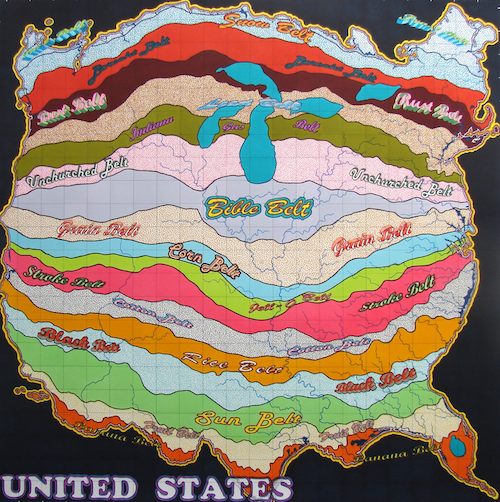
In March 2010, I loaned my ex-boyfriend $4,000 so he could buy a car and move across the country to Los Angeles. Part of the reason he was driving to Los Angeles in the new car was to get away from me, and to make sure that we wouldn’t keep sticking back together like an exasperating roll of packing tape.
Giving him $4,000 wasn’t a problem: I had a fund earmarked for retirement that my grandmother had been helping me stock, and he was taking a lucrative job at a mega telecom and would soon be able to pay it back. And he was, in many ways, family, someone I’d spent six years with on and off, who had seen me at various points sick and vomiting and bloody. He was some weird postmodern combination of brother, friend, and Rhett Butler; we had been partners in a journey across states, and jobs, and illness, and religious crises, and achieved and aborted academic degrees. As with family, my money was his money and his was mine, and so I withdrew 200 twenties from my bank account and deposited them into his.
A few weeks before I felt those bills in my hand, I met another man at a party. His name was Chris. “I want to take you to dinner,” Chris said, sincerely, drunkenly, repeatedly. “You can,” I said, and he did.
After the loan, and maybe five dates with Chris, my ex-boyfriend asked me to drive with him to Los Angeles in the new car. It was a life-changing move, literally and mentally, he explained, and though his brother would meet him in Denver for the second leg, he needed company for the first.
“I’m driving to Denver,” I told Chris, who had sensed that there was an ex somewhere in the far background of the picture. “With the guy?” he said. “With the guy,” I said. “And then it’s over?” he said. “And then it’s over,” I said. I didn’t tell him I had paid for a third of the car.
The car was a Saab, and it was nice—silver, fairly new, with a cockpit-like dashboard and upgraded sound system. We attached a U-Haul in Washington D.C., passed through Pennsylvania where we photographed ourselves at roadside Amish cheese boutiques, spent the night at a deserted Econo Lodge, and entered Kansas with its thin, hopeful-looking windmills. In that car, through Americana and the heartland, we were the way we always were when we were breaking or broken up: full of humor, and flirtation, and sass, making and breaking vaporous plans—California! Los Angeles!—all with a romantic edge of deeply painful regret. We finally parked the car in the open-air parking lot of the Denver airport, and sat listening to the radio as the mountains rose improbably from the surrounding flatness like the set of a fantasy novel, or an overwrought television drama.
We finally parked the car in the open-air parking lot of the Denver airport, and sat listening to the radio as the mountains rose improbably from the surrounding flatness like the set of a fantasy novel.
Since that drive, I’ve rarely talked to my ex-boyfriend. I’ve been negotiating among the fact that we were family, and the fact that we weren’t, and the fact that Chris and I are a new kind of family that is immediate, real, and probably permanent, but with a history that is still in many ways more shallow than what my ex and I have. But there’s also still the matter of the money. In one of our few phone calls, we had the kind of argument we sometimes used to have, where one or both of us becomes unreasonable, and I asked about the money. “If you’re going to be like that,” he said, “I’m not paying you back.”
This is why we broke up, I thought. That sudden serrated edge, the shake of the camera lens. How could he not feel the burning need to get rid of this debt as soon as possible? How could he not understand that though my money was his and his was mine, the debt remained outstanding? Or was that ridiculous. My money was still his, and his was mine.
Shortly afterward I told Chris that I had lent my ex-boyfriend $4,000. You idiot, said his face. “Good luck,” he said aloud. “You’ll never see that money again.”
“Yes, I will,” I said.
Very recently my ex and I had another conversation, one that went very well, very reasonably. He told me he’d been promoted even farther into the ranks of upper management at his multinational enterprise—something that didn’t surprise me since he had found the exact arena in which his charm, ambition, and savvy could massively succeed. With the promotion came a raise, I assumed, and in the middle of the call, I blurted out, “Where’s my money?”
“Oh, that?” he said, with maddening ease. He had been sending money to his mother, he said, but he could send her less and instead begin sending the difference to me either by check or direct deposit. All I had to do was tell him my preference.
I didn’t need the money back right this minute, I told him. But I want it. I want the debt to be over. I don’t want this thread of obligation, this sticky residue. And I wanted to prove Chris wrong, and anyone else wrong, to prove that I was right to hand the money over in the first place, that I would be right if I ever had to do it again. I sent him my bank account information. It’s been a week. I have no doubt that the money will begin to appear soon.


